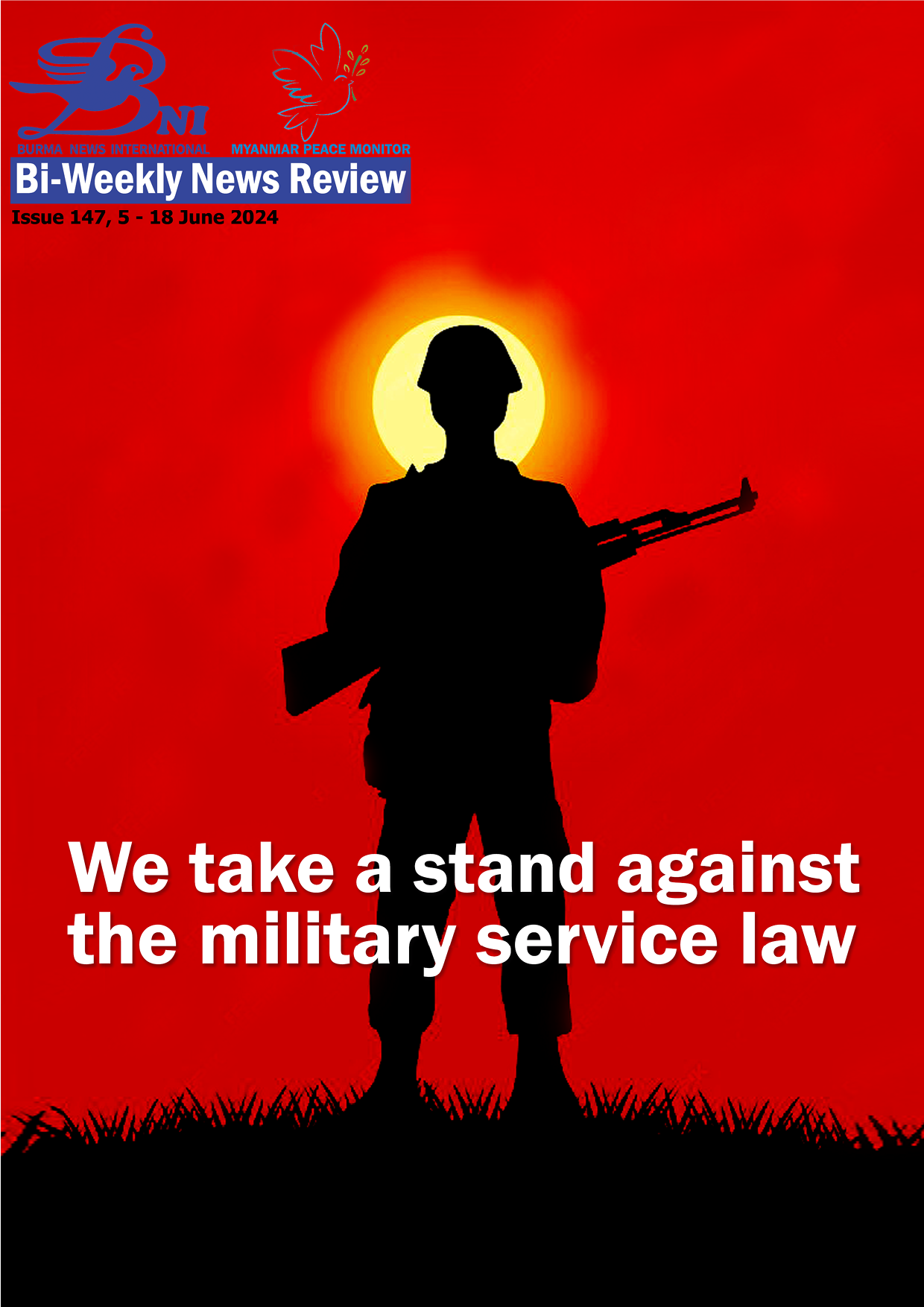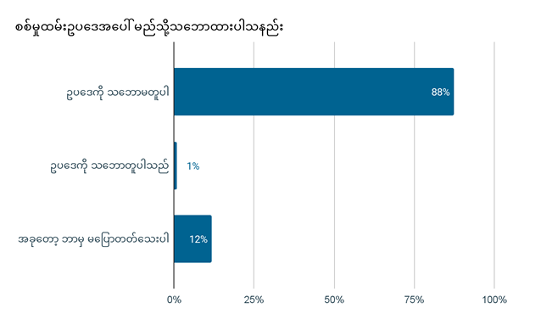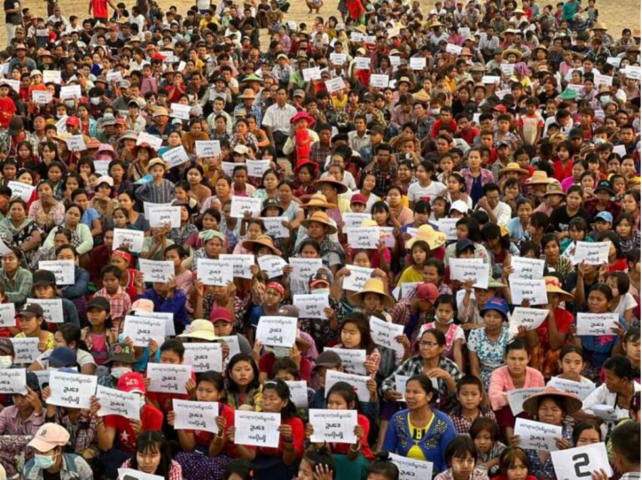
Introduction
“The right to refuse to kill must be accepted completely”
– Sir Nigel Rodley, the former chairperson of the United Nations Human Rights Committee.
In June this year, the New Rehmonnya Federated Force (NRFF) released a preliminary study report on the People’s Military Service Law: “People’s Militia Strategy for the Military Junta and the Cycle of Anxiety for the Mon People”.
This week’s Burma News International (BNI)-Myanmar Peace Monitor’s bi-weekly news review spotlights the report’s findings and discusses the repercussions following the junta’s enforcement of the military service law.
Military Service Law and Report Findings
On 10 February 2024, the junta announced the enforcement of the People’s Military Service Law, which was originally enacted during the tenure of former Senior General Than Shwe in 2010. Remarkably, the law was put into force 13 years after its initial enactment. It can also be seen that that the regime, engaged in conflict with resistance across the country after the military coup, has utilized the conscription law to bolster its dwindling military forces.
Regarding the survey report “People’s Militia Strategy for the Military Junta and the Cycle of Anxiety for the Mon People” 1 published by the NRFF, data were collected through the interviews with 264 respondents: 167 in-person and 97 online respondents from 10 townships in Mon State.
According to the report, the news about the military service law was heard mostly from Facebook and Telegram, and 88 percent of the survey respondents disagreed with the military service law. Twelve percent of respondents did not provide comments, while only one percent of respondents agreed with the conscription law.
When asked about the reasons for the activation of the military service law by the junta, 208 respondents (almost 80 percent of all respondents) cited that the junta aimed to “replenish its dwindling military strength”. In addition, 163 respondents identified “to enlist the people in the army and use them as human shields” as the second most likely reason for the activation of the military service law by the junta.
More than 100 respondents indicated that “granting authority to the military council to bluntly arrest civilians as porters, allowing junta officials at various levels to accept bribes, and defending against resistance from revolutionary groups” could be three reasons for the activation of the military service law. At the same time, 66 respondents considered the separation of revolutionaries and Civil Disobedience Movement (CDM) staff as a reason for the activation of the military service law. Only four respondents viewed it as a measure “to defend against external threats, such as from China.”

When asked about public responses to situations where the conscription law can be avoided, 176 respondents indicated a preference for two measures: illegal means of traveling abroad for work and using official channels for employment. These measures received the highest number of responses. At the same time, when asked about the “Public Response in the Unavoidable Situation of Conscription Law”, the majority of the respondents answered that they would join the revolutionary groups.
A total of 131 respondents stated they would join a People’s Defense Force or a revolutionary group that emerged after 2021. Additionally, 107 respondents indicated they would join ethnic armed resistance groups, while 93 respondents expressed their intention to go to liberated areas or IDP camps.
That is to say, according to the findings of a survey from Mon State, the majority of respondents expressed dissatisfaction with the military junta’s implementation of the military service law. At the same time, they aim to avoid the military service law by seeking work abroad, whether through legal or illegal means. If unable to evade it, they have decided to join nearby revolutionary groups and resist the regime.
Related Events
At the first regular session of Lower House Parliament on 11 March 2011, U Soe Win, Lower House MP from Sanchaung Township Constituency, asked a question about when the military service law would be implemented. Union Attorney General U Aye Maung replied, “This law will only come into force when the President himself issues an order.”
During the cabinet meeting of the military council on 2 February 2022, coup leader Senior General Min Aung Hlaing stated, “Every citizen has a duty to serve in the military. We have not yet enforced the military service law due to ongoing internal armed conflicts.” 2 On 10 February 2024, the military council announced that “the People’s Military Service Law has come into force because the current situation in the country has made it necessary to apply the militia strategy.” In April 2024, the first batch consisted of 4,300 civilians underwent two weeks of military training across the country, followed by a second batch of 9,300 in May.
A 25-year-old man residing on Zay Road in Ward No. 16, Taungoo, Bago Region, tragically took his own life by hanging himself after learning that he was on the military service list. The victim who died on 8 April, left behind his wife, a 3-year-old son, and a one-year-old daughter. 3 In March 2024 alone, five young men in Ayeyarwady Region—one from Yay Twin Chaung village in Kangyidaunt Township, one from Pyapon Township, one from Einme Township, one from Kyangin Township and one from Labutta Township—committed suicide due to the military service law. 4
Muslim villages in Sittwe Township of Arakan State are also being summoned by the military council to serve in the military, and if they refuse, the junta threatens to cut off international aid and demand 50,000 kyats. In addition, servicemen and their family members are being incentivized to obtain citizenship scrutiny cards. 5

At the same time, up to 82 ward and village administrators, clerks, and heads of 100-households have been killed for their involvement in implementing the junta’s military service law, compiling lists, and conducting draft lotteries. 6
Within four months after the activation of the military service law, and most of those killed are from Yangon, Mandalay, Magway, Sagaing, Bago, Kachin and Mon. Mandalay Region has the highest number of members of the administration killed, with 24 in connection with the military service law, followed by Magway Region.
The People’s Embrace formed with CDM military personnel, said that more than 26,000 young people from all over the country who do not want to serve in the military for the military council have contacted their group. Approximately 80 percent of these individuals have expressed a commitment to resisting the military council, and the People’s Embrace has facilitated connections with resistance groups.
Review
As analyzed in our bi-weekly news review: Could the worrisome conscription law work? (Issue-139) 7 , despite the activation of the “People’s Military Service Law” causing significant public concern, the junta’s efforts to address its declining military strength have fallen short of expectations.
According to the report “People’s Militia Strategy for the Military Junta and the Cycle of Anxiety for the Mon People” which was conducted in Mon State, it can be said that the movement of young people across the country, who are eligible for the military service law, do not agree to serve in the army of the military council. The military junta should reconsider its implementation of the military service law, which aims to use civilians and youth to fight against fellow citizens.
International governments, including the United Nations, should pay special attention to the actions of the junta, which is targeting millions of young people from across Myanmar for recruitment into the military. The social crisis in Myanmar triggered by the implementation of the conscription law has had repercussions that extend beyond the country’s borders. Myanmar youths of ethnic origin who do not want to serve in the military are seeking various ways to avoid joining the army.
It is crucial to immediately prevent and halt the military council’s efforts to criminalize refusal to join the army. We would like to conclude with the historic opinion of former chairperson of the United Nations Human Rights Committee Sir Nigel Rodley.
“The right to refuse to kill must be accepted completely”
1 The People’s Military Service Law: “People’s Militia Strategy for the Military Junta and the Cycle of Anxiety for the Mon People”, NRFF, June 2024
2 Chairman of the State Administration Council Prime Minister Senior General Min Aung Hlaing delivers a speech at the meeting of the Union Government of the Republic of Myanmar (1/2022) and, Myanmar Digital News, 2 February 2022
3 Man listed for military service in Taungoo commits suicide, DVB, 11 April 2024
4 At least five young men in Ayeyarwady Region commit suicide due to the military service law, DVB, 15 April 2024
5 The junta forces people in Muslim villages in Sittwe to join the army by threatening to cut off international aid if they refuse, Narinjara, 8 April 2024.
6 Over 80 junta administrative members killed after activation of military service law RFA, 13 June 2024.
7 Could the worrisome conscription law work? (Issue-139), BNI-MPM, March 2024
